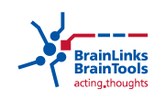Aaron Schurger (Laboratory of Cognitive Neuroscience & Center for Neuroprosthetics École Polytechnique Fédérale de Lausanne and NeuroSpin Research Center, CEA-Saclay, France) | Cortical activity is more stable when sensory stimuli are consciously perceive
| When |
Feb 10, 2015
from 05:15 PM to 06:45 PM |
|---|---|
| Where | Lecture Hall, Hansastr. 9a |
| Contact Name | Carsten Mehring |
| Add event to calendar |
|
Abstract
According to recent evidence, stimulus-tuned neurons in the cerebral cortex exhibit reduced variability in firing-rate across trials, after the onset of a stimulus. However, in order for a reduction in variability to be directly relevant to perception and behavior, it must be realized within trial – the pattern of activity must be relatively stable. Stability is characteristic of decision states in recurrent attractor networks, and its possible relevance to conscious perception has been suggested by theorists. However, it is difficult to measure on the within-trial time scales and broadly distributed spatial scales relevant to perception. We recorded simultaneous magneto- and electro-encephalography (MEG and EEG) data while subjects observed threshold-level visual stimuli. Pattern-similarity analyses applied to the data from MEG gradiometers uncovered a pronounced decrease in variability across trials after stimulus onset, consistent with previous single-unit data. This was followed by a significant divergence in variability depending upon subjective report (seen / unseen), with seen trials exhibiting less variability. Applying the same analysis across time, within trial, we found that the latter effect coincided in time with a difference in the stability of the pattern of activity. Stability alone could be used to classify data from individual trials as ‘seen’ or ‘unseen’. The same metric applied to EEG data from patients with disorders-of-consciousness exposed to auditory stimuli diverged parametrically according to clinically diagnosed level-of-consciousness. Differences in signal strength could not account for these results. Conscious perception may involve the transient stabilization of distributed cortical networks, corresponding to a global brain-scale decision.












